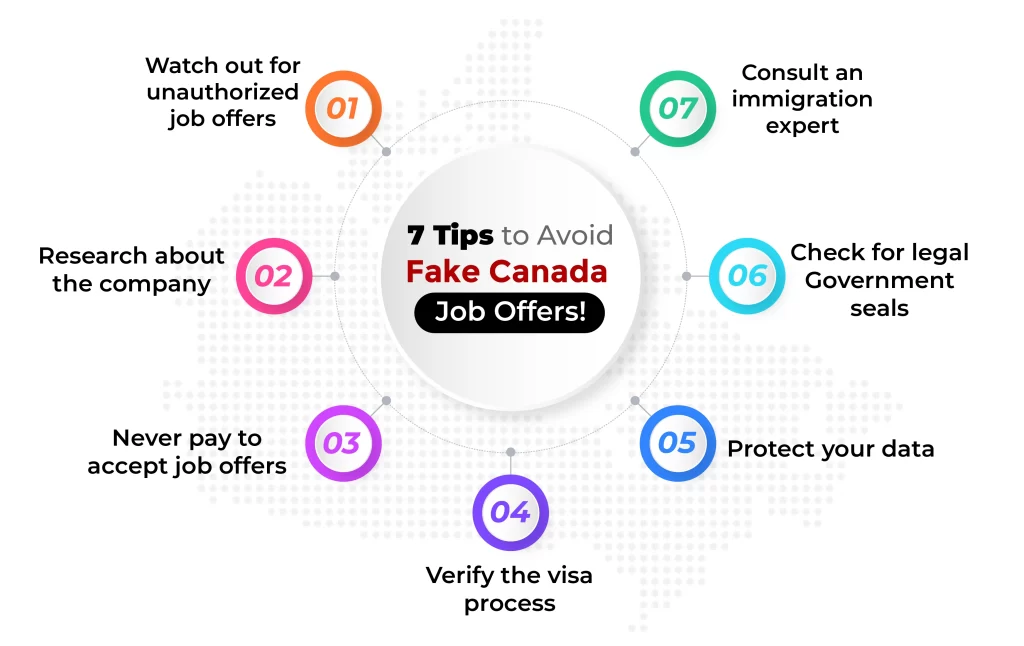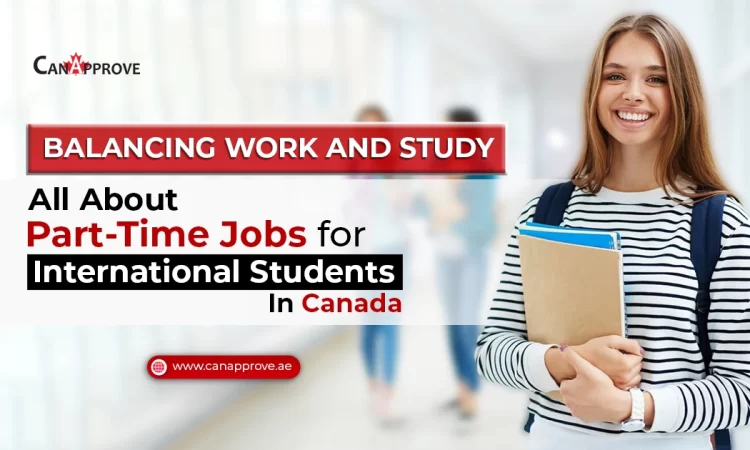In case you’re not aware of fraudulent job offers in Canada, here’s a piece of valuable information! Scammers create fake websites and generate fake offer letters to scam innocent job applicants from all over the world. It can be very dangerous to accept a fake job offer letter from Canada. Read on to learn about the tips to avoid fake job offers in Canada.
How Do I Spot a Fake Canada Offer Letter?
Not sure if your offer letter from Canada is legit or not? These points could be a “heads up” to you on how to spot a fake job offers from Canada
1. Comes from an unidentified email address or phone number
It may be a fake job offers from Canada if the application is sent from an email address that does not include a legit company name or any other information about the business. If you are not completely sure that the email or message is legitimate, do not respond to it.
2. Demands payment from you in exchange for employment
Do not accept a job offer from an employer if they want you to complete a paid training course or pay a fee before you start working. That is certainly a fraudulent Canadian job offer.
3. You are asked to provide your Social Insurance Number (SIN)
The majority of fake job offer letters from Canada request Social Insurance Numbers (SINs) from people. Never forget that you are responsible for your social insurance number and that employers are not allowed to request your SIN from you.
4. Language with errors or an informal tone
Job offers are typically sent in a standard language. The offer letter could be fraudulent if you notice any errors in the grammar, spelling, fonts, or font size.
5. Inquires about your personal information
Your job offer may be fraudulent if it requests that you provide your bank account information, credit/debit card information, and other personal details before you start working.
7 Tips to Avoid Fake Canada Job Offers
Here are some tips that you can be mindful of when you receive a fake Canada job offer.
1. Watch out for unauthorized job offers
Some unanticipated job offers might seem like a wish turned into reality, but they might also be a trap. Unexpected job offers may indicate fraud or fake employment. It’s always better to stay safe from being scammed. Steer clear of job offers that guarantee high salaries, bonuses, or other benefits that are substantially greater than what is standard in the industry. Scammers use these strategies to trick unaware job seekers into falling for their scams.
2. Do thorough research about the company
You must thoroughly study the company that has offered you a job when looking for employment opportunities in Canada. This is important, especially if the job offer seemed to be unreal or came out of the blue. Spend some time checking out the company’s website, social media accounts, and online reviews to make sure they are a genuine company.
3. Never pay to accept job offers
It’s important to remember that you will be offered a job based on your qualifications, experience, and interviews. Nobody can promise you a job in return for money. Any company that promises you a job in exchange for a payment should be avoided. Research the company to make sure it is reliable and legitimate. When considering a job offer that involves a payment, it is advisable to thoroughly research the company.
4. Verify the visa application process
Learn about the requirements for the particular job offer and the procedure for obtaining a Canadian visa. Scammers frequently make false statements about their ability to guarantee a visa or speed up the application process. For accurate information, the official website of the Government of Canada is the most reliable source.
5. Protect your data
“Urgency” is one of the tools scammers use to trick you into deciding before you have had a chance to confirm the offer’s legitimacy. Do not feel pressured to send payments or disclose personal information. Instead, take your time to speak with reliable sources and pose questions.
6. Check for legitimate government seals
Scammers frequently use easily forged seals and logos, even though they may appear official. Verify the authenticity of any papers by cross-verifying them with official sources, such as the website of the Canadian government or the appropriate embassy.
7. Consult an immigration expert for assistance
It is important to have a trustworthy immigration consultant on your side if you are thinking about relocating to Canada for employment. They can support you in navigating the immigration process as well as confirming the legitimacy of any job offers you may receive.
A trustworthy immigration consultant can assist you in spotting warning signs and preventing fraud. Make sure to do thorough research and choose an immigration consultant with knowledge of Canadian immigration law. To confirm the validity of immigration consultants, visit the website of the Immigration Consultants of Canada Regulatory Council (ICCRC).
Wrap-Up
Receiving job opportunities abroad could be exciting and overwhelming. However, it is always best to be cautious about your employment offers. Doing a background check is a “must,” especially when you’re receiving job offers from another country!
To ensure your move to Canada goes smoothly, it is best to work with a reputable immigration consultant. Don’t hesitate to reach out to one for assistance.
CanApprove is a CICC (#R422511) registered multinational firm and ensures to assist you right from filling out your application until you become a permanent resident of Canada. If you’d like to know more, talk to our experts at CanApprove; we’d love to hear from you!
FAQS
1. How do I get a job offer in Canada from outside?
You can look up Canadian businesses and industries that fit your skills and experience if you have a particular area of interest or expertise. To learn more about job openings, visit their websites, follow them on social media, or contact their human resources or recruitment teams.
2. How can I check if a company is real in Canada?
If you want to find out if a person or business is registered, use the National Registration Search. Check out this guide to understanding registration search results if you have any questions, or get in touch with your regional securities regulator.
3. How can you tell if a Canadian job offer is real?
If a Canadian company has offered you a job, take the time to investigate the company. Check for a company website, online employees, client reviews, and even the Canadian Business Registry to establish whether it is a real business.



